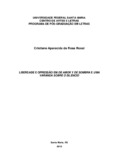| dc.creator | Rossi, Cristiane Aparecida da Rosa | |
| dc.date.accessioned | 2016-05-13 | |
| dc.date.available | 2016-05-13 | |
| dc.date.issued | 2015-11-26 | |
| dc.identifier.citation | ROSSI, Cristiane Aparecida da Rosa. FREEDOM AND OPPRESSION IN DE AMOR Y SOMBRA AND UMA VARANDA SOBRE O SILÊNCIO. 2015. 95 f. Dissertação (Mestrado em Letras) - Universidade Federal de Santa Maria, Santa Maria, 2015. | por |
| dc.identifier.uri | http://repositorio.ufsm.br/handle/1/9940 | |
| dc.description.abstract | Since 1964 and 1973, Brazil and Chile, respectively, were taken over by civil-military dictatorship as a consequence of the confrontation of poles of power instituted in the world after the end of the Second World War (1939-1945) and the beginning of the Cold War (1945-1991). Authoritarianism, according to Umbach (2012), consists in a political regime in which the state controls the society, manipulating its political participation and narrowing the possibilities of social mobilization. The present study intends to analyze the sociopolitical contexts of the literary works De amor y de Sombra, written by Isabel Allende (1942), and Uma varanda sobre o silêncio, by Josué Montello (1917-2006). Both novels were published in 1984, and in each plot, the main characters are involved, directly or indirectly, with the military dictatorship and its consequences. Based on the study of the novels‟ central characters, the main objective of the work is to problematize the relationship of women within authoritarianism and their submissive social condition under an androcentric and patriarchal institution. Conservative society has traditionally considered procreation and maternity as women‟s main social roles, through which they would be fully integrated in the social world (SWAIN, 2007). The influence of such themes are here considered in relation to Literature and are understood as ways for social transformation. The approach to the methodology used in this study will be comparative analysis of the aforementioned novels, as well as research related to the proposed themes, from Beauvoir (2009), Muraro (1995), and Swain (2007). Results will show that the composition of the female character, when analyzed under from different perspectives, varies in relation to the genre. The final considerations of this study will point to the prelude of new times, in which women abandon the conventional patterns to which they were used to, revealing to the world different ways to face a traditional society, whose political forces, most of the time, were superior to love. | eng |
| dc.format | application/pdf | por |
| dc.language | por | por |
| dc.publisher | Universidade Federal de Santa Maria | por |
| dc.rights | Acesso Aberto | por |
| dc.subject | Literatura | por |
| dc.subject | Autoritarismo | por |
| dc.subject | Papéis sociais | por |
| dc.subject | Identidade feminina | por |
| dc.subject | Literature | eng |
| dc.subject | Authoritarianism | eng |
| dc.subject | Social roles | eng |
| dc.subject | Feminine identity | eng |
| dc.title | Liberdade e opressão em De amor y de sombra e Uma varanda sobre o silêncio | por |
| dc.title.alternative | Freedom and oppression in De amor y de sombra and Uma varanda sobre o silêncio | eng |
| dc.type | Dissertação | por |
| dc.description.resumo | A partir de 1964 e de 1973, a ditadura civil-militar implantou-se no Brasil e no Chile, respectivamente, em consequência ao enfrentamento entre os pólos do poder, instaurados no mundo com o final da Segunda Guerra Mundial (1939-1945) e o início da Guerra Fria (1945-1991). O autoritarismo, segundo Umbach (2012), consiste em um regime político no qual o estado controla a sociedade, manipulando sua participação política e estreitando as possibilidades de mobilização social. Pretendemos analisar, no presente estudo, os contextos sociopolíticos das obras De amor y de Sombra, escrita por Isabel Allende (1942), e Uma varanda sobre o silêncio, escrita por Josué Montello (1917-2006), ambas, em 1984. Em ambos os enredos, as personagens centrais envolvem-se, direta ou indiretamente, com a ditadura militar e suas consequências. Objetivamos refletir, com base no estudo das personagens centrais dos romances, sobre a relação da mulher com o autoritarismo e sobre o servilismo da condição social outorgada pela sociedade androcêntrica e patriarcal à mulher. A sociedade conservadora vem considerando, tradicionalmente, a procriação e a maternidade como os principais papéis sociais femininos, responsáveis pela integração da mulher no mundo social (SWAIN, 2007). Consideramos as influências dos temas mencionados, em relação à Literatura, compreendida como um meio de transformação social. A metodologia empregada no presente estudo será a análise comparativa dos romances anteriormente referidos, bem como a recorrência às pesquisas, relacionadas aos temas propostos, de Beauvoir (2009), Muraro (1995) e Swain (2007). Os resultados demonstrarão que a composição da personagem feminina, ao ser analisada sob diferentes vieses, varia em relação ao gênero da autoria. As considerações finais deste estudo apontarão para os prenúncios de novos tempos, em que mulheres abandonam os padrões convencionais de normalidade a que estavam acostumadas, revelando, então, ao mundo, maneiras distintas de encarar uma sociedade conservadora, cujas forças políticas, muitas vezes, eram superiores ao amor. | por |
| dc.contributor.advisor1 | Montemezzo, Luciana Ferrari | |
| dc.contributor.advisor1Lattes | http://buscatextual.cnpq.br/buscatextual/visualizacv.do?id=K4127964D7 | por |
| dc.contributor.referee1 | Zinani, Cecil Jeanine Albert | |
| dc.contributor.referee1Lattes | http://lattes.cnpq.br/5031600091227253 | por |
| dc.contributor.referee2 | Silva, Vera Lucia Lenz Vianna da | |
| dc.contributor.referee2Lattes | http://buscatextual.cnpq.br/buscatextual/visualizacv.do?id=K4777668Y5 | por |
| dc.creator.Lattes | http://lattes.cnpq.br/6691997303817832 | por |
| dc.publisher.country | BR | por |
| dc.publisher.department | Letras | por |
| dc.publisher.initials | UFSM | por |
| dc.publisher.program | Programa de Pós-Graduação em Letras | por |
| dc.subject.cnpq | CNPQ::LINGUISTICA, LETRAS E ARTES::LETRAS | por |


